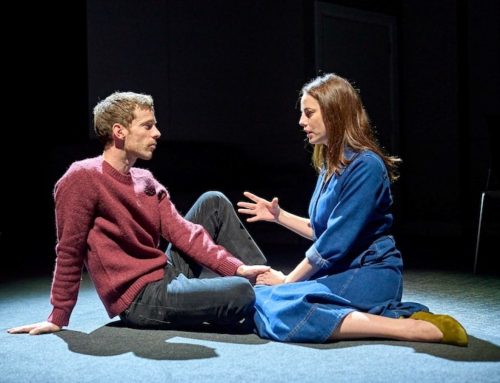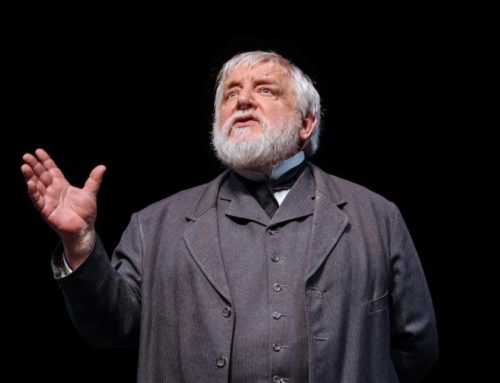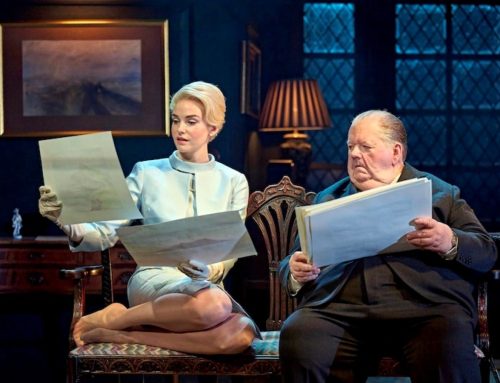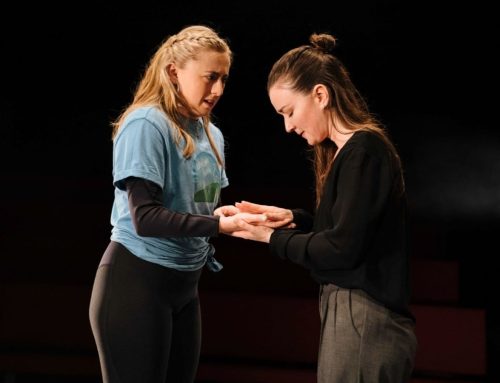Satinder Chohan’s slice of Asian women’s life, set in a Southall beauty salon, is a richly observed and immaculately performed gem.
19 May 2022
It is not often, thankfully, that we see a character getting their toenails cut on stage. But such a queasily personal moment, literally the cutting away of the rotten to reveal something reborn, feels absolutely appropriate in Satinder Chohan’s delightful comedy drama.
Punjab-native Reita, a great turn by Kirin Landa, owns a shabby and crumbling, women-only beauty parlour in a Southall back-street. The shop ceiling sheds plaster wherever a train goes by, and the facial machine keeps breaking down, so no wonder she dreams of moving up to bigger and better things.
The main thing standing in the way of Reita’s spa ambitions is the tricky task of getting aged mother-in-law BD, a tremendous tour-de-force from a bewhiskered and bedaggered Soud Faress, to sign on the dotted line and sell the family home.
Reita’s secretive 15-year-old daughter, Pinky, spikily played by a fizzy Anshula Bain, has a week off school for work experience, so joins a none-too-keen mum in the salon. The teenager has all the tradition-busting zeal of a second-generation immigrant and, when not grumbling about the unfair advantages her ‘golden boy’ brothers enjoy, sets about devising a scheme for getting her first Brazilian wax.
Poorly-paid salon assistant Tanwant lives a shed in Reita’s back garden and dreams of a passport marriage to save her from deportation back to Pakistan. When Pinky offers help in finding the frantic Tanwant a husband, the agreement they cook up is destined to lead to dismal consequences for both of them.
The final character of the female quintet is store cleaner Kamal, played with poise by Ulrika Krishnamurti. Burdened with a dictatorial mother-in-law and brutal husband, and haunted by the recent suicide of a salon customer, Kamal faces some tough choices of her own.
In resolving these various plot lines, Chohan takes us on a journey around issues that one senses are deeply personal for the writer and her cast, something which I think explains the extent to which the actors so entirely understand and inhabit their characters. Director Pooja Ghai has coaxed some hugely empathetic turns from a first class set of performers.
The narrative explores, amongst other things, the second-best status of girls in many traditional sub-continent families; the challenges of multi-generational living in arranged marriages; the abuse of illegal immigrants; the sexual grooming of teenagers; and the extent to which younger generations are torn between tradition and snapchat modernity.
Lotus flowers grow best in muddy waters, but are renowned for remaining pure, untouched, and unaltered by the contamination in their environment. The narrative explores whether the play’s five characters can survive similarly well, untouched by the sometimes grimy reality of a Southall upbringing. It is fair to say not everything works out for everyone, but Chohan keeps us guessing for long enough to keep it moving and engaging.
The dialogue can sometimes sound more like it written to be read, rather than spoken. It works best in the kind of mixed Punjabi and English patois that BD and Tanwant use, although both characters have a suspiciously good understanding of English poetic idiom for non-native speakers.
Lotus Beauty is a delightfully well drawn, and I suspect, deeply personal story of the trials and tribulations of Asian women in the UK. Highly recommended.
WRITER Satinder Chohan
DIRECTOR Pooja Ghai
DESIGNER Rosa Maggiora
LIGHTING Matt Haskins
Cast
PINKY Anshula Bain
BIG DHADHI Souad Faress
TANWANT Zainab Hasah
KAMAL Ulrika Krishnamurti
REITA Kiran Landa
Duration: 2hours 35 minutes. One interval.
Full Disclosure: I paid full box-office price for the ticket.

More Recent Reviews
Playfight. Soho Theatre.
Writer Julia Grogan’s breathtakingly assured debut play arrives at Soho Theatre following stellar reviews at the Edinburgh Fringe and [...]
All The Happy Things. Soho Theatre.
Naomi Denny’s three-hander comedy-drama All The Happy Things covers familiar themes within a recognisable premise. A grieving protagonist comes [...]
Telly. Bread and Roses Theatre.
The challenge with absurdist comedy is that many people do not find it funny. Laughing at the sheer weirdness [...]





